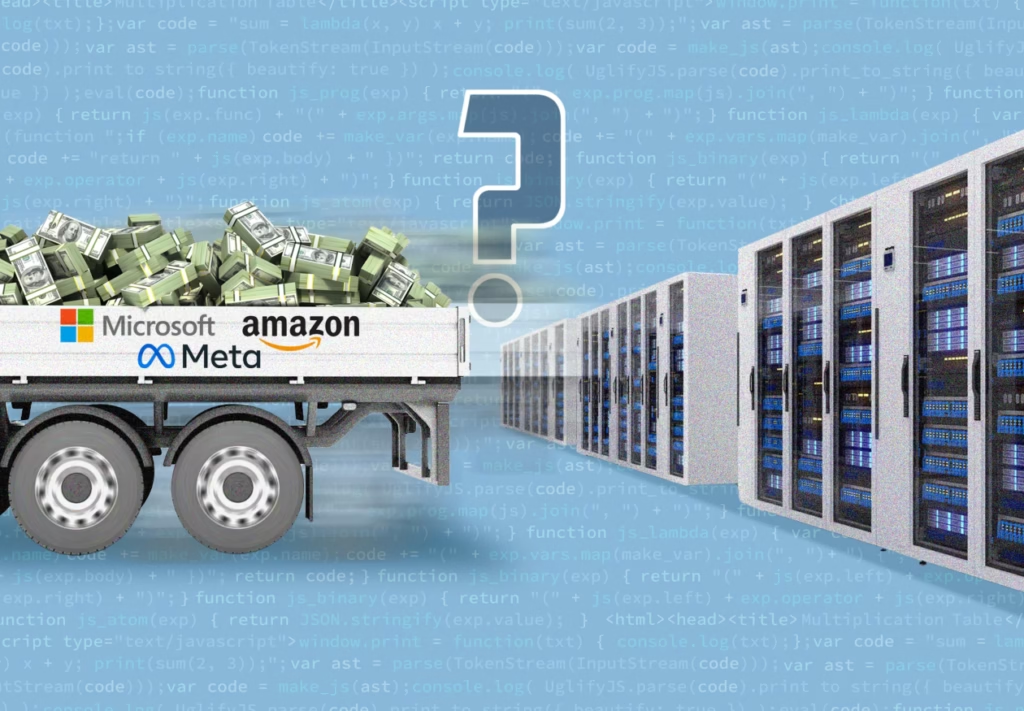After the most recent earnings season, one thing is certain: Big Tech intends to move forward and allocate enormous sums of money for the expansion of artificial intelligence data centers.
Some on Wall Street are worried that businesses may be investing too much in AI given the technology’s poor returns on investment thus far, and this is even as markets have dropped off this year due to recession fears. There is concern that if the economy enters a recession, businesses might have to make reductions. Chip manufacturers like Nvidia Corp. (NVDA) and other hardware firms that have profited from the spending boom will likely be impacted by it.
But Big Tech isn’t giving up just yet. According to Evercore ISI analysts, U.S. hyperscalers’ capital-expenditure growth expenditures rose to 71% in the first quarter, totaling over $81 billion in spending.
Additionally, Microsoft Corp. (MSFT) and Alphabet Inc. (GOOG) (GOOGL) increased its capital-expense estimate during earnings season, while Meta Platforms Inc. (META) reaffirmed its capital-spending projections. Amazon.com Inc. (AMZN) reported spending $24.3 billion in the first quarter, primarily to satisfy demand for AI services, but did not provide a capital expenditure projection this week. It estimated that it will spend roughly $100 billion this year in February.
All things considered, it still looks that Meta, Amazon, Alphabet, and Microsoft will invest more than $300 billion this year in the development of AI data centers and their supporting infrastructure.
Based on the stock movements, Wall Street appeared to be satisfied with the spending intentions.
Despite the need to reduce overall budgets, several analysts predict AI will continue to be a top priority.
Last month, Crawford Del Prete, president of market research firm IDC, stated, “This is just such an extraordinary situation,” in response to the Trump administration’s erratic tariff news. He claimed to have just had a conversation with an IT executive who was reducing expenditures. “They are stalling, they are freezing,” he stated.
A few weeks ago, IDC predicted that total IT spending would increase by almost 9% this year; however, analysts now anticipate 4% to 5% growth. “There’s a general hesitancy associated with the uncertainty that we are experiencing,” Del Prete stated, referring to the intricate tariff situation. He anticipates that businesses will keep investing money on AI infrastructure, but at the price of other IT expenditures, which are predicted to decline.
“The AI efforts, they are going to prioritize those,” he continued, adding that businesses are instead putting new projects or things that alter their business practices on hold. “That is where I have seen the biggest stall, but they are not stalling altogether, they are just pausing.” If businesses have ambitions for AI development, he continues, “stopping that has a big downstream effect.”
In a note to clients on Friday, analyst Srini Pajjuri of Raymond James adopted a similar stance.
“While additional tariffs could impact hardware demand, we expect AI-related spending to be more resilient, given the long lead times and intense competition among hyperscalers,” he stated.
In previous notes during the past few weeks, there had been a lot of investor inquiries and concerns before this week’s earnings. Investors took notice when Bloomberg reported that Amazon and Microsoft were reducing their investments in certain early-stage data center projects. However, both companies reaffirmed their commitment to their spending targets in LinkedIn posts.
Microsoft CEO Satya Nadella continued, “The reality is we’ve always been making adjustments to build, lease, what pace we build all through the last, whatever, 10, 15 years,” during his company’s earnings call on Wednesday. He believes that Microsoft considers factors including power requirements, geographic balance, and future workload requirements, and he is happy with the speed of the company’s efforts.
For the current quarter, Microsoft still does not anticipate having enough capacity to match the demand for AI cloud services.
Evercore ISI analyst Amit Daryanani commented, “We believe the increase in capital expenditure projections should allay any worries about recent discussions about pauses or moderation in data center capacity demand.”
However, despite this week’s profit announcements, some people are still worried that the corporations might be overspending, particularly in light of China’s AI advancements with products like DeepSeek that aim to reduce the cost of computing power required to fuel AI.
According to Gil Luria, an analyst at D.A. Davidson, “Google and Meta may decide to remain more aggressive as they increasingly fall behind in AI, but that could very well backfire with investors.” “If they stick with their out-of-control capex plans in a potentially weakening economy investors may lose patience.”
This week, Seaport Research Partners’ Jay Goldberg began covering Nvidia’s stock, giving it the sole sell recommendation on Wall Street. One of his worries? “Growing scrutiny of AI budgets at enterprises and direct customers.”
Goldberg pointed out “enterprises searching for compelling AI applications beyond minor 10% to 20% cost reductions in limited areas,” stating that “this is a natural function of technology adoption curves, but that curve looks fairly steep right now.”





